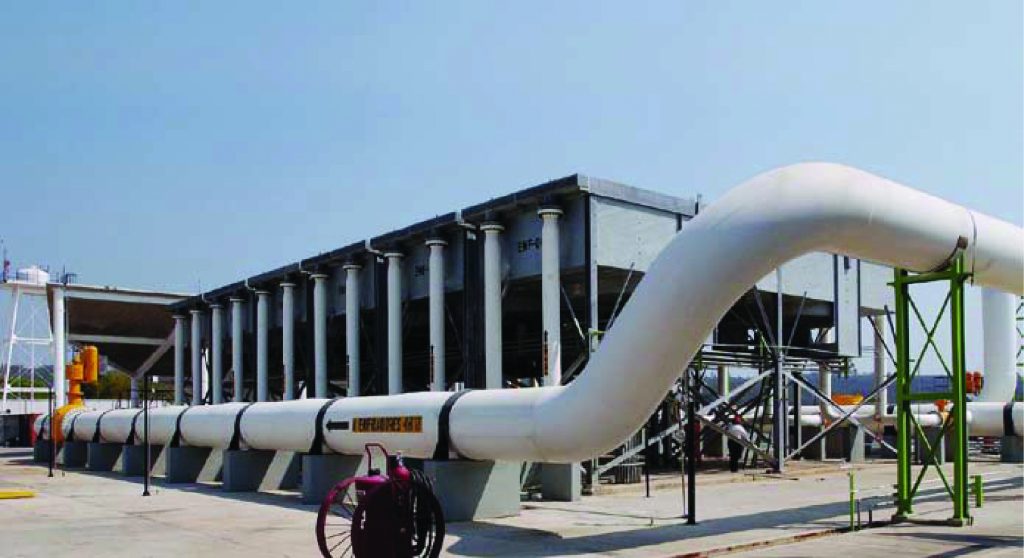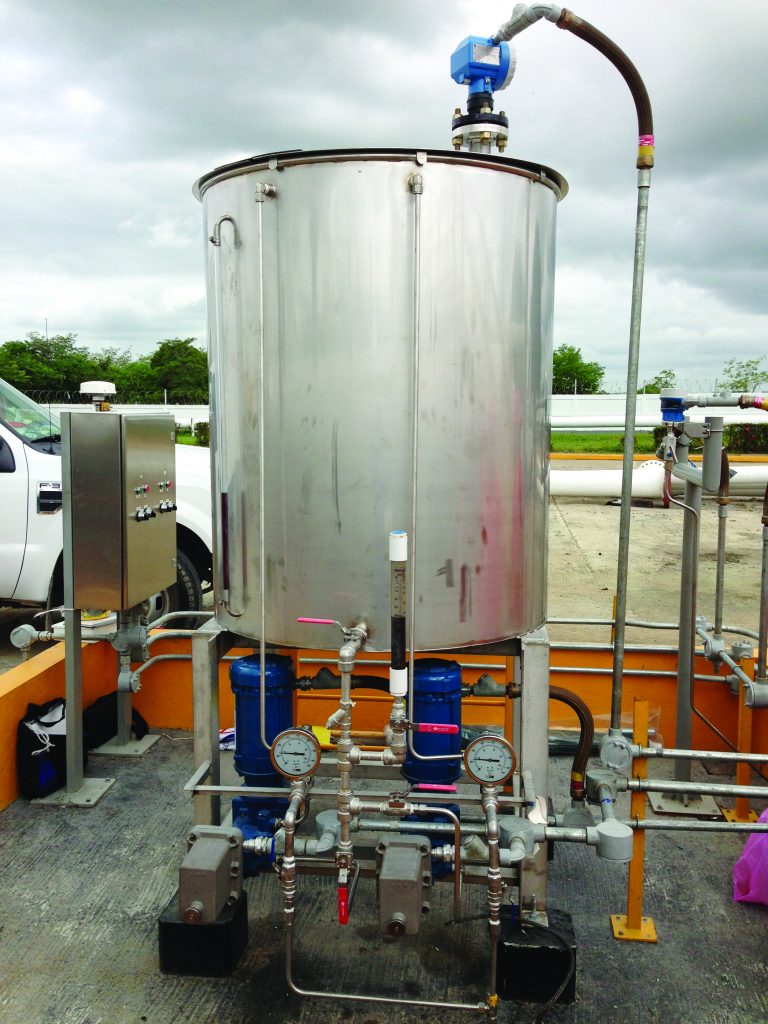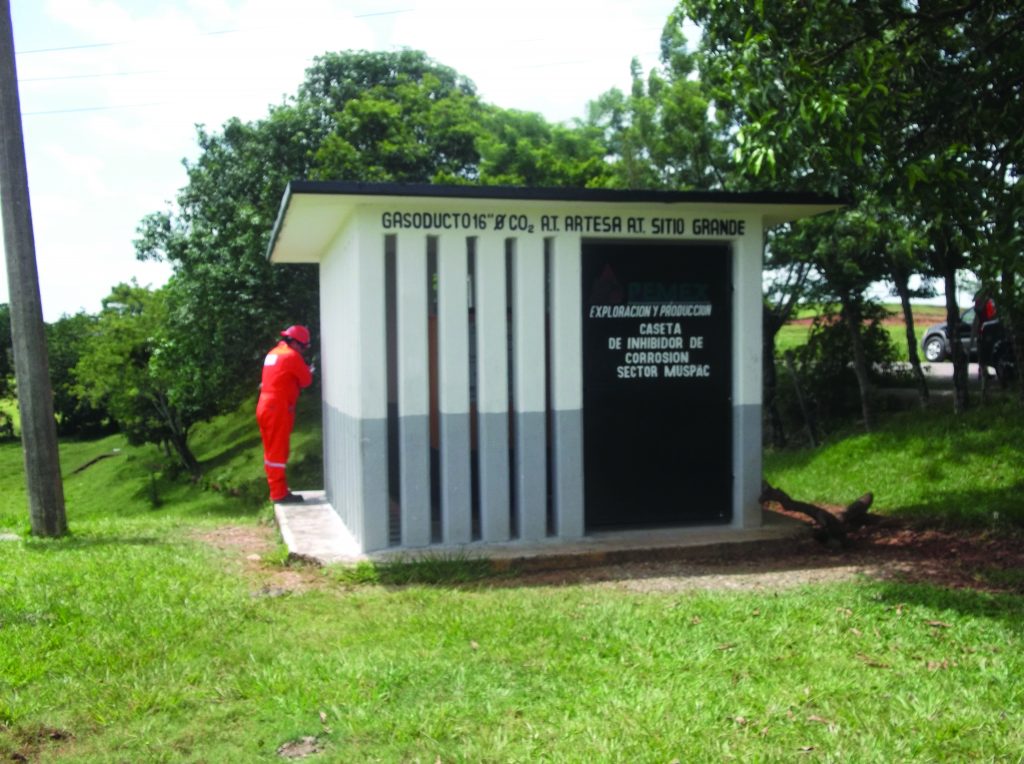.jpg?sfvrsn=16a97971_4)
Neptune™ Model 5005-S-N3-FALP diaphragm metering pump
When A Latin American Oil Company Optimized The Injection of Corrosion Inhibitors Into Its Pipelines, 500 Series Hydraulic Diaphragm Metering Pumps from Neptune™ Were a Unanimous Choice for the Job
Author: Tom O’Donnell, Director of Business Development with Neptune™ and PSG®
As it reached 75 years of operation, a Latin American oil company had grown to become the world’s fifth-largest oil producer and the region’s second-largest enterprise by annual revenue, behind only the Brazilian national oil company Petrobas.

A major Latin American oil company has a pipeline network that covers more than 8,000 square miles of Mexican countryside. In order to help keep the pipeline operating effectively, even in the most severe weather conditions, the company is using 500 Series Hydraulic Diaphragm Metering Pumps from Neptune™ Chemical Pump Co. to inject corrosion inhibitors.
Though the oil company’s rate of daily production has been declining steadily over the past decade, from an all-time high of 3.48 million barrels per day (b/d) in 2004 to 2.52 million b/d in 2013, that rate of production still equates to nearly 920 million barrels per year of oil production, which is still a lot of product that needs to be moved to various end points, including refineries, storage terminals and retail sites. To facilitate this crude oil transport and transfer, this Latin American oil company operates a network of pipelines that covers nearly 8,000 miles.
Setting off a Chain Reaction
A pipeline system this vast and complex needs to be kept operational at all costs, less downtime adversely affects the company’s ability to meet production and delivery schedules. A common reason for pipeline breakdowns and malfunctions is corrosion that can be caused by the oil being transported or environmental factors. To combat these situations, corrosion inhibitors are periodically injected into the pipeline to protect it from the attacks of corrosive elements.
“We had the opportunity to work with the people who were working on the design of the injection of chemicals in the pipeline system for the company,” said Oscar Ruiz, a longtime consultant with many contacts in the Latin American oil and gas industry. “The company was looking for pumps that could satisfy its needs for reliable injection rates, while possessing the capability to be operated remotely in harsh weather conditions.”
Being intimately familiar with the company’s needs, Ruiz turned to his network of contacts, in the process setting off a nearly two-year chain reaction that would eventually result in one of the most significant pump orders in the history of Neptune™ Chemical Pump Co., North Wales, PA, USA. Since 2008, Neptune has been a leading product brand of PSG®, Oakbrook Terrace, IL, USA, a Dover company.
Ruiz’s first call, in early 2012, was to his friend Jim Janes, for whom he works as a consultant. Janes is the President of Janes Industrial Products, LLC, Scott, LA, USA, a manufacturer and supplier of specialty cleaning compounds for the industrial, aviation and remediation industries.
“I’ve known Jim since 1995 and in 2005 he developed a solvent for this type of application,” said Ruiz. “We have also worked together in the past selling chemicals to one of the water-treatment plants in Mexico. It makes it far better that we trust each other.”
Once the chemical source was identified, Ruiz needed to find the right chemical-injection pump for the application. Working off of Janes’ recommendation, he contacted FLIP, Inc., of Baton Rouge, LA, USA, which was a sales representative firm from 1975 to early 2015.
“Oscar contacted our office and asked us to look at some injection systems for the oil company,” explained Ernie Spreen III, a former Outside Sales for FLIP., Inc., and now co-owner of KEEN Solutions LLC with Jimmie Kenaley, a new Neptune representative. “The company was looking to replace the pneumatic pumps it was using because with the heat and how they configured them, they weren’t lasting long at all. There was not enough air available to use the pneumatic diaphragm pumps, it was too dirty to mess with and they needed someone to make sure the filters were clean. At first, they were looking for little solenoid pumps with fiberglass backing with no storage tanks, then started looking at pump skids, but eventually realized they would need something that could stand up to the harsh climate where the equipment would be located.”
The Right Pump for the Process
That eventually led to the decision to use strictly stainless-steel equipment in the field, and Ernie Spreen’s endorsement of Neptune 500 Series Hydraulic Diaphragm Metering Pumps — specifically the 515 model with stainless-steel components, electronic stroke control, explosion-proof operation and installation on 316SS skids — for the job. In all, the oil company would require 43 complete skid systems and a total of 86 pumps.
“Neptune pumps are the best for all applications for injection,” said Spreen. “They are a simplistic pump that is highly repeatable and highly reliable. They can handle high pressures, and more than half the oil company’s applications would be 1,000 psi, so we could configure the systems identically so they could go anywhere in the country and function in any condition. No pump would really work in this application except for what we were offering.”
Ruiz was quick to second the recommendation. “I have used Neptune pumps in a couple of projects, including one in Costa Rica where we had some injection packages made in one shop,” he said. “We used eight Neptune injection systems in one plant and it was a good experience. The company was very pleased because they were very accurate in their dosing. We have also specified Neptune pumps in water-treatment plants that were pumping 20,000 gallons per day of produced water and they worked well there, too.
One final hurdle to getting the Neptune pumps approved for the project had to come from the engineering firm that was partnering with the oil company on the project. In another fortuitous turn, Neptune had supplied pumps to the engineering company for past projects, so it was a name that the engineering firm was familiar with.
“They were happy to work with us and the team at the oil company was accepting of everything that was involved with the equipment,” said Ruiz.
“We had a meeting with them, went through the pumps and discussed things,” added Spreen. “Once they got the pumps on-site and put their hands on them they understood why the Neptune 500 Series was the pump that was selected for them.”

Neptune fabricated 43 complete corrosion-inhibitor injection systems for the oil company that consist of a pair of 515 model diaphragm metering pumps and a stainless-steel 250-gallon tank in which the corrosion inhibitor is stored. All are able to be operated remotely, which is a benefit in harsh operating conditions, while also reducing the need to manually set dosing levels, as well as the number of on-site man-hours required to service the system.
With all of the pieces put in place, the next step was to get the pumps on-site and operating. Each of the 43 pump locations would be set up the same. Neptune also supplied a 250-gallon stainless-steel chemical-storage tank for each site, with the pumps and accessories installed within a locked enclosure to prevent damage or theft.
The pumps, which can be controlled remotely, can inject pipeline corrosion inhibitor at a rate of 12 to 20 gallons per day with the relief valves set for a high pressure of 1,300 psi, though the maximum operating pressure will be closer to 1,180 psi. Once a week, a technician will come out and refill the storage tank and inspect the pump, with an oil change required every three to six months.
“It’s really a simple system,” said Spreen. “You’ve got a stainless-steel drip pan underneath, a locking mechanism for the covers to keep down shrinkage, and rain shields to keep rain out of the vents and fill ports. It’s set up so that the oil company can padlock everything down so intruders can’t get into it, tamper with the lines or steal chemicals, because they do have an issue with that.
“They also have extreme heat conditions for nine months out of the year, along with storm conditions, so one of the design features we added was to install the pump itself and the motor under the storage tank to give them protection from the elements. The stroke control is also sealed and all of the pumps are explosion-proof and NEMA-7 rated. The tank is all 316 stainless steel, even the legs. There is nothing on that system that should have any corrosiveness to it.”
Another major benefit for the oil company of the Neptune pumps is their ability to be controlled remotely, meaning the dosing levels—whether 0.5 gallons per hour or 5.5 gph— can be set off-site based on the readings supplied by the pipeline.
“They have satellite control of the liquid levels, equipment and probes that are placed within the pipeline and note how much inhibitor needs to be used,” said Spreen. “It is a completely unmanned installation.”

In some areas, the oil company plans to protect Neptune’s pipeline corrosion-injection systems with enclosures designed to keep out the elements and eliminate instances of tampering.
It was a proud moment for Neptune in late December 2013 when the first pump skid was installed by the Latin American oil company, a moment that was the culmination of two years of cooperation between a number of entities, all of whom based their recommendations on the trust and reputations that have been built over many decades of reliable service.
“The standard that the oil company has developed for this type of system is what we and Neptune have provided, said Ruiz. We are hoping that Neptune becomes standard for them for other applications like this.”
About the Author:
Tom O’Donnell is Director of Business Development with Neptune™ and PSG®. He can be reached at (215) 699-8700 or Tom.ODonnell@psgdover.com. Based in North Wales, PA, USA, Neptune Chemical Pump Co., is a leading manufacturer of chemical metering and peristaltic (hose) pumps, chemical feed systems, chemical injection accessories, make-down systems and portable mixers. Neptune is an operating company within PSG, Oakbrook Terrace, IL, USA, a Dover company. PSG is comprised of several leading pump companies, including Abaque®, Almatec®, Blackmer®, Ebsray®, EnviroGear®, Griswold™, Mouvex®, Neptune™, Quattroflow™, RedScrew™ and Wilden®. You can find more information on Neptune at neptune1.com and PSG at psgdover.com.